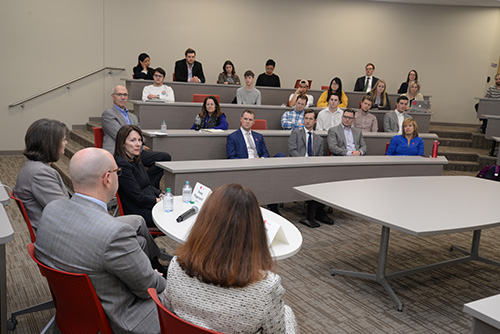Four prominent Nebraska Business alumni comprised the Executive Insights panel at Howard L. Hawks Hall, October 18. Their message to the primarily student audience emphasized finding meaning in the workplace by taking on new responsibilities. The event, sponsored by The School of Accountancy and Department of Finance, gave attendees the opportunity to question the panelists, who between them possess more than 110 years of experience in banking, insurance and accounting firms.
Sue Wilkinson, ’90, senior vice president and chief financial officer for Ameritas, perceives mobility in the workplace as directly tied to personal flexibility. Although an accounting major, she transitioned between accounting, marketing, printing, risk management and several other positions during her career.
“I’ve been with the same employer 23 years but I count it as about eight jobs,” Wilkinson said. “Use your natural curiosity to learn and do different things, and it will take you where you need to be. Some jobs provide very clear progression, but my growth came about by trying different things and not being afraid to move around. Early in one’s career it may be about targeting how you want to move up the ladder, but the longer you work, you’ll find greater mobility in the willingness to do different things.”
Echoing Wilkinson’s comments, Laura Schulte, ’81, worked as an executive with Wells Fargo for 30 years, and believes in the power of taking initiative at every opportunity. She told students not to worry about where they stand in the organizational chart.
“I encourage you to get a wide variety of experiences even if they don’t pay you more money or give you a new title. The things that impacted my career success the most were not true promotions. They were things where I was already doing a time-consuming job and someone said, ‘We need somebody to help over here,’ or ‘We need your skills in another area.’ That’s where you get the bang for your buck, because you learn something new and are going to be much more valuable. To be the president of a company you want to have a broad range of experiences,” Schulte said.
 The primarily student audience questioned the panelists about everything from their greatest struggles in business to their biggest concerns about information security.
The primarily student audience questioned the panelists about everything from their greatest struggles in business to their biggest concerns about information security.
In addition to being willing to take on extra assignments, Teresa Poggenpohl, ’83, senior managing director of marketing and communications for North America at Accenture, finds people who ask for what they want are more likely to receive it. She tries to lead by example by not only wearing multiple hats at Accenture, but stressing the importance of communication.
“People who raise their hands and express an aspiration for wanting to move to the next level are more likely to make an impression on me,” Poggenpohl said. “If someone never takes on any stretch roles or never expresses an interest in going to the next level it may never happen. Companies don’t necessarily work in a perfect manner, so you have to make sure people know your aspirations, especially in a high-growth company where you get tapped to do extra things, or in an environment where someone quits and leaves a void waiting to be filled. In the highly technical field I’ve worked in, it’s very fast paced, so it often felt like having many different jobs at the same time.”
Matt Epp, ’93, audit partner in Ernst & Young’s financial services practice, works in an accounting environment where mobility is more structured. Nevertheless, according to Epp, young people have an advantage of adapting to newer technologies which ultimately brings rewards.
“Technology can be a challenge but it can also create an opportunity,” said Epp. “Think about how you embrace technology and bring innovation to your workplace. We’re constantly trying to bring new technologies into our business, so our people are freed up to do more analysis by letting the technology do the detail work. Think about how you can do work differently, because that’s where we look to our young people. They’re the ones who’ve been around technology their whole lives, and they have fresh ideas about how we can do our work more efficiently.”
Published: October 22, 2018